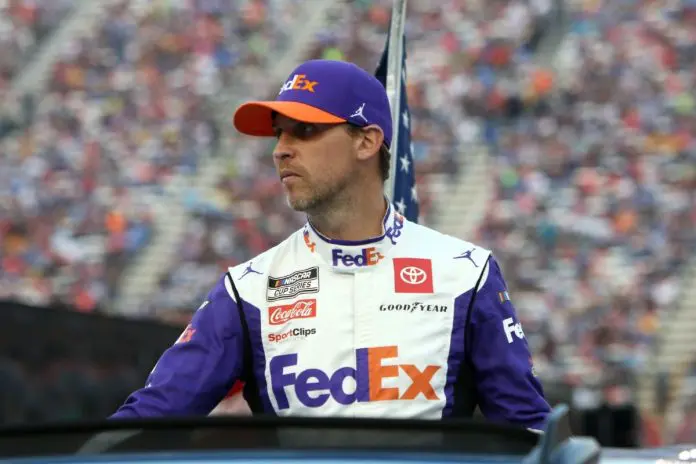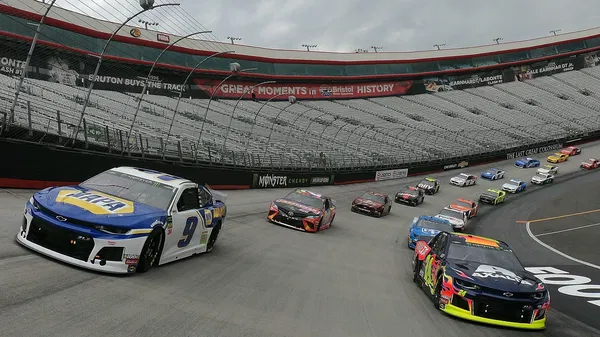Denny Hamlin’s Bold Move Against NASCAR’s Greed
Denny Hamlin’s recent criticism of NASCAR’s financial practices represents a significant turning point in the sport’s history, challenging the established dynamics of a 20-year partnership. By calling for a fairer distribution of media revenue and the implementation of permanent charters, Hamlin is voicing the concerns of many in the racing community. This stance poses substantial risks for his own team, 23XI Racing, but could also spark a broader movement among stakeholders, leading to critical discussions about the future of NASCAR’s economic model and its traditional relationships.
Key Highlights
Denny Hamlin is advocating for a more equitable sharing of media revenue, taking issue with NASCAR’s economic policies, which he believes disproportionately benefit a select few.
His call for permanent charters is intended to ensure long-term stability and fairness for racing teams, underscoring the need for mutual respect.
Hamlin’s position puts his team, 23XI Racing, at risk, reflecting a major shift in the sport’s financial dynamics.
The absence of NASCAR officials at crucial events suggests a growing rift and potential marginalization of 23XI Racing.
Hamlin’s bold stance could unite teams with similar grievances, potentially leading to significant changes in NASCAR’s financial structure and long-term appeal.
The Economic Policy Protest
As the expiration of the charter agreement approached, increasing discontent with NASCAR’s economic policies became evident. Teams have been struggling with the financial pressures imposed by NASCAR’s rigid economic structure, leading to widespread protests over the past year. These escalating costs have strained many teams, sparking demands for reform.
Despite months of vigorous debate, NASCAR’s leadership has made only minor concessions, which have done little to alleviate the frustrations of the teams. This minimal response has exacerbated feelings of disconnect between NASCAR and the smaller teams struggling to stay competitive. Many stakeholders feel that NASCAR’s economic policies benefit only a few and deepen the divide between the sport’s elite and the more vulnerable teams.
While most teams have reluctantly accepted the prevailing authority of NASCAR, two teams, including Denny Hamlin’s, have emerged as vocal critics of the current system. Their opposition highlights the broader struggle for fair treatment and could serve as a catalyst for others with similar concerns.
As the charter agreement’s expiration looms, the protests emphasize the urgent need for NASCAR to address these economic disparities or risk alienating a significant portion of its racing community.
Denny Hamlin’s Defiant Stance
Denny Hamlin’s confrontational approach towards NASCAR’s financial policies has established him as a key figure in the fight for fairness within the sport. With a distinguished career that includes 54 Cup Series wins, Hamlin has transitioned from celebrated racer to a formidable advocate for change. His challenge against the organization that has supported his career underscores the seriousness of his position.
Hamlin’s advocacy focuses on several critical issues:
– **Media Revenue Distribution:** He argues that teams deserve a larger share of media profits, asserting that their contributions merit fair compensation.
– **Charter Negotiations:** Hamlin demands the establishment of permanent charters to offer teams stability and long-term viability.
– **Team Autonomy:** By asserting that neither NASCAR nor the teams owe each other anything, he emphasizes the importance of mutual respect and independence.
Despite the potential risks, including the jeopardy facing his team, 23XI Racing, Hamlin remains steadfast in his efforts. His recent comments reflect a growing frustration among team owners and drivers with NASCAR’s current economic framework. Hamlin’s actions could instigate a significant shift in the sport’s economic landscape, challenging existing norms in pursuit of greater fairness and sustainability.
NASCAR’s Response and 23XI’s Isolation
A visible rift has developed between NASCAR’s leadership and 23XI Racing, highlighted by the absence of NASCAR officials at the trophy presentation for Tyler Reddick’s regular season championship win. This absence serves as a stark representation of the growing divide between NASCAR and the team co-owned by Denny Hamlin. Hamlin’s remarks suggest that a significant change in perspective would be necessary for reconciliation.
The isolation of 23XI Racing from NASCAR’s core activities is becoming increasingly apparent, raising concerns about the team’s future and identity within the sport. The lack of engagement from NASCAR’s senior officials casts doubt on the potential for constructive collaboration and mutual benefit in a sport that relies heavily on unity.
Hamlin’s forthrightness reveals an underlying tension that could have lasting effects on both NASCAR and 23XI Racing. The absence of NASCAR officials not only indicates a potential fracture in their relationship but also poses critical questions about the future role of 23XI Racing in a sport perceived as increasingly driven by corporate interests. Both parties must navigate this complex situation carefully to avoid further alienation and work towards a sustainable future for NASCAR.




